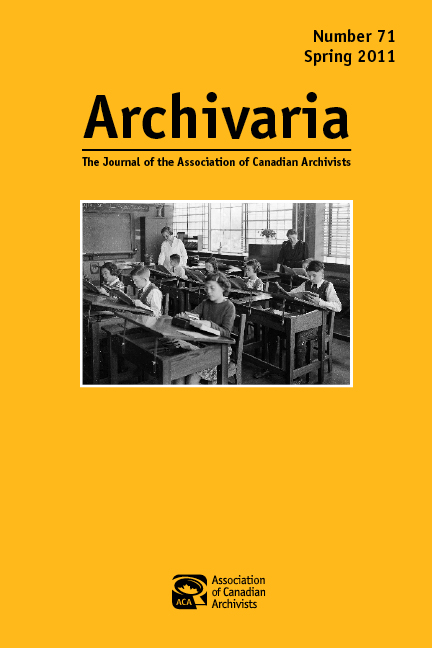The Documentary Moment in the Digital Age: Establishing New Value Propositions for Public Memory
Abstract
Our lives are constantly recorded through surveillance and sousveillance; we also continuously and instantaneously record ourselves at work, at play, in public and private conversation, and in our business and social relationships. In the midst of all this production and consumption of information, two basic questions are emerging in relation to the current and continuing preservation of information resources and knowledge: What is the relevance of information professionals in such an informationladen and information-intensive society? How will this relevance be manifested? This essay explores aspects of these questions with reference to the seamless moment of time and space within the remembering process when communities become aware of, and confront, the instability, fragility, and ephemeral nature of memory. This is when collectivities must finally – very deliberately and selfconsciously – invest in, and provide for, the preservation of information initially as a social or economic asset, and subsequently, as an accessible civic good of public memory bringing meaning to society over time. To focus the discussion, the essay reflects upon the nature and dimensions of the critical decision-making experience, what many information professionals would typically term appraisal or acquisition, but what we will call the documentary moment.
Our sense of the documentary moment in the digital age is that archives and archivists, in conjunction with others – those within and beyond traditional information resource domains – can continue to play prominent roles and fulfill key responsibilities both now and into the future. This essay will explore the option to focus on the public endowment and preservation of our foundational civic goods – the original documents of our decisions and actions, and the information in our books and other documentary media and artifacts – that are required within society to articulate, express, and share common goals, assumptions, values, and ethics; to provide individuals and groups with the capacities of social literacy necessary to enable their democratic participation within communities; and to ensure accountable public administration and responsible governance under the rule of law. In effect, this essay is about the identification and preservation of society’s documentary causa materialis.
RÉSUMÉ
Nos vies sont sans cesse documentées par la surveillance et la sousveillance; de façon constante et instantanée, nous documentons aussi nos activités au travail, nos moments de loisir, nos conversations publiques et privées et nos relations professionnelles et sociales. Devant l’abondance de cette production et consommation de l’information surgissent deux questions de base liées à la conservation actuelle et continue des ressources de l’information et du savoir : quelle est la pertinence des professionnels de l’information dans une telle société à forte intensité d’information? Comment cette pertinence se manifestera-t-elle? Ce texte explore certains aspects de ces questions en lien avec le processus de la mémoire, plus particulièrement le moment précis dans le continuum de l’espace et du temps où des communautés deviennent conscientes de l’instabilité, de la fragilité et de la nature éphémère de la mémoire et où elles se confrontent à cette réalité. C’est le moment où les collectivités doivent enfin – de façon délibérée et consciente – s’engager dans la préservation de l’information, d’abord comme capital social et économique, et ensuite comme un bien civique accessible de la mémoire publique, capable de donner un sens à long terme à la société. Afin de mieux cibler cette question, ce texte se penche sur la nature et les dimensions de l’expérience critique de prise de décision, ce que plusieurs professionnels de l’information appelleraient typiquement l’évaluation ou l’acquisition, mais que nous nommerons le moment documentaire.
Notre vision du moment documentaire à l’ère numérique est que les archives et les archivistes, en lien avec d’autres – travaillant dans le domaine des ressources d’information traditionnelles ou à l’extérieur – peuvent continuer à jouer des rôles importants et à s’acquitter de responsabilités clés tant maintenant qu’à l’avenir. Les auteurs explorent l’option de mettre l’accent sur le bien public et sur la préservation de nos biens civiques fondamentaux – les documents originaux de nos décisions et de nos actions, l’information contenue dans nos livres et nos ressources documentaires dans d’autres médias, ainsi que nos artefacts – qui sont nécessaires pour qu’une société puisse articuler, exprimer et partager des buts, des suppositions, des valeurs et des éthiques communs; de fournir aux individus et aux groupes les capacités d’alphabétisation sociale nécessaires pour leur permettre une participation démocratique dans des communautés; et d’assurer une administration publique imputable et une gouvernance responsable sous l’État de droit. Ce texte porte donc réellement sur l’identification et la préservation de la causa materialis documentaire de la société.
Authors of manuscripts accepted for publication retain copyright in their work. They are required to sign the Agreement on Authors' Rights and Responsibilities that permits Archivaria to publish and disseminate the work in print and electronically. In the same agreement, authors are required to confirm that "the material submitted for publication in Archivaria, both in its paper and electronic versions, including reproductions of other works (e.g. photographs, maps, etc.) does not infringe upon any existing copyright." Authors of manuscripts accepted for publication retain copyright in their work and are able to publish their articles in institutional repositories or elsewhere as long as the piece is posted after its original appearance on archivaria.ca. Any reproduction within one year following the date of this agreement requires the permission of the General Editor.





